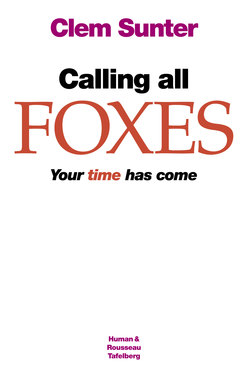Читать книгу Calling all Foxes - Clem Sunter - Страница 5
На сайте Литреса книга снята с продажи.
ОглавлениеThe gypsy lords
One of the most important roles of a scenario planner – especially a foxy one – is to pick up the megatrends which are reshaping the world. They become the new rules of the game, according to which the future may play out. In this article, the trend chosen is the growth of super-rich families on a cosmopolitan scale. They are immune to economic cycles. On a recent visit to London, I heard of a house that had been put on the market in Kensington for £75m. It needed another £10m spent on it to restore it to its former glory. No wonder one estate agent in the area said that every one of the last 60 houses she had sold was to foreign families. Not one British buyer could afford the asking price. Last year, sales of Rolls Royce and Bentley cars worldwide increased by over 30%. Life is unfair, isn’t it?
I call them the “gypsy lords”. They are the roving kind and they have the money and the talent to wander wheresoever they choose.
In South Africa, you will find them in the gated golf estates or suburbs like Kloof in Durban, Hyde Park in Johannesburg and Constantia in Cape Town. Basically places where you can lock up and go away for six months of the year. We used to call them “swallows” when it was just English people following the sun; but now it is a variety of nationalities that find South Africa a favourable place to chill out with their preferred glass of champagne in hand while texting their private banker.
They have no allegiance to any particular country – only their own families and friends. They schedule their stays in each country to minimise their tax. Some spend part of the year in luxury cruise ships where no official can claim them as a resident of anywhere. Others fly their luxury cars with them as they cannot do without their pet wheels. Of course, the richest of them all have their own private jets as caravans to ferry them to any destination at a whim.
South African-born gypsy lords usually have houses in the south of France, flats in Chelsea and one or two exotic pads elsewhere in Africa. Virtually the whole of Knightsbridge and Kensington is in the hands of Russian and Middle Eastern gypsy lords. They have driven up real estate prices to a level which not even wealthy English people can afford. How about £20m for a nice house or £1bn for a Premier League soccer side?
The new emerging class of gypsy lords are from India and China with a sprinkling from South America and Africa. In Johannesburg, you know you have a gypsy lord next to you when you have a permanent security presence in the street made up of men in dark glasses with tinted-windowed BMWs.
For the gypsy lords, the recession is an opportunity to spread their global footprint. They snap up businesses which are famous brands that have hit hard times. Some ostentatiously display their wealth at charity functions and by hitting pole position in lists of richest families. Others hide behind a veil of secrecy and nominee companies. They do not want the grey side of their businesses to surface in the public domain. They shun the media or own it.
Globalisation has weakened the power of governments to hold the gypsy lords accountable. Indeed, the tough financial circumstances and growing debt problems of nations worldwide have turned the gypsy lords into some of the most influential powerbrokers in the universe. Forget presidents and prime ministers. The gypsy lords and their purses hold sway. They follow one step behind and issue the instructions.
So in future, please don’t talk of gypsies in derogatory terms or picture them only in barren fields surrounded by hostile homeowners. Remember that mobility has become a key characteristic of the Internet and Twitter age. Somewhere a gypsy lord is pulling strings which somehow will have an impact on your life. If things get really nasty, he will simply move to another country and pull the strings from there. That is the reality of existence in the teenage years of this century.
